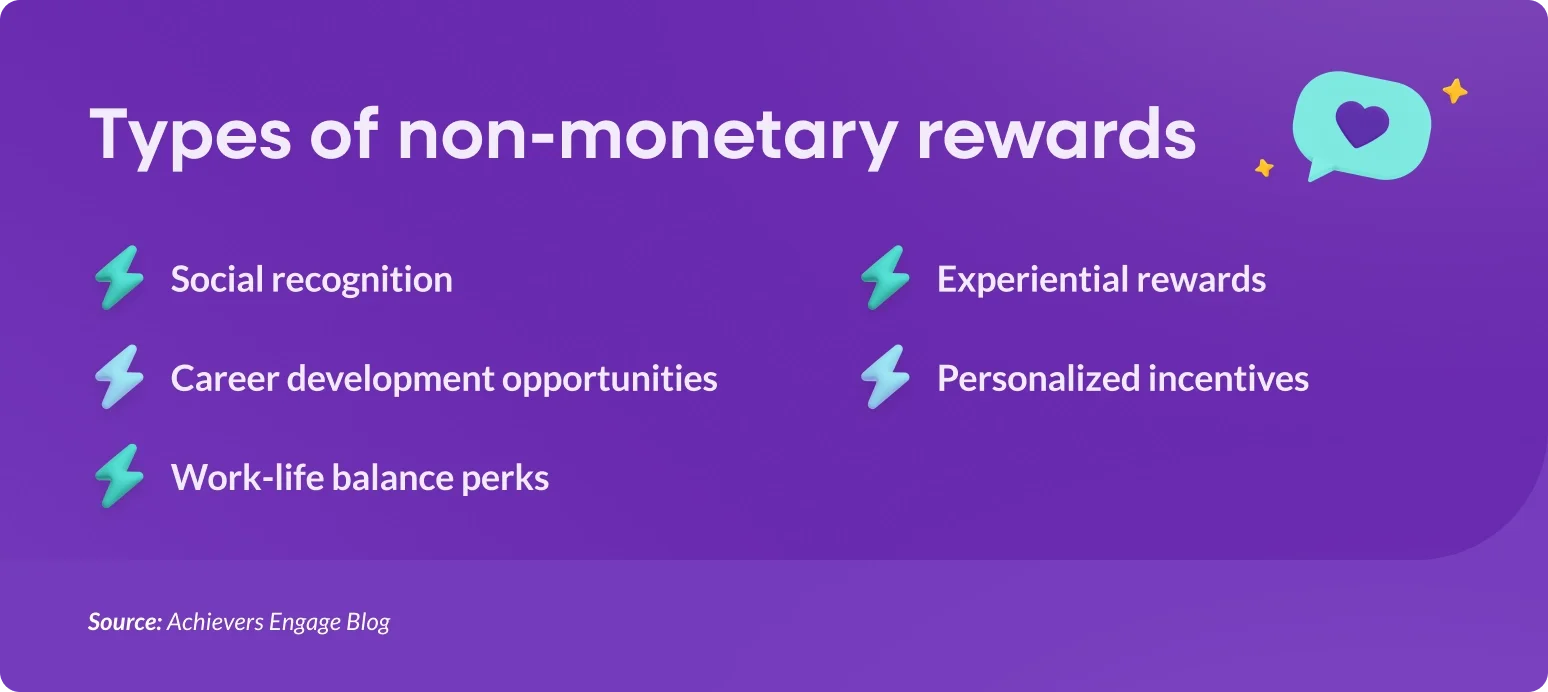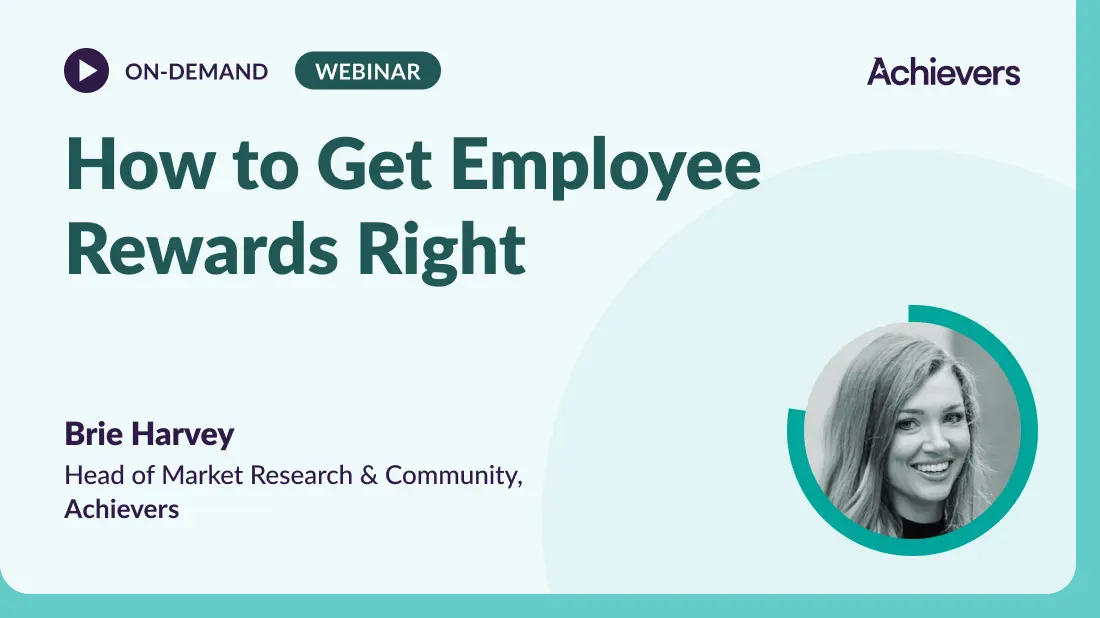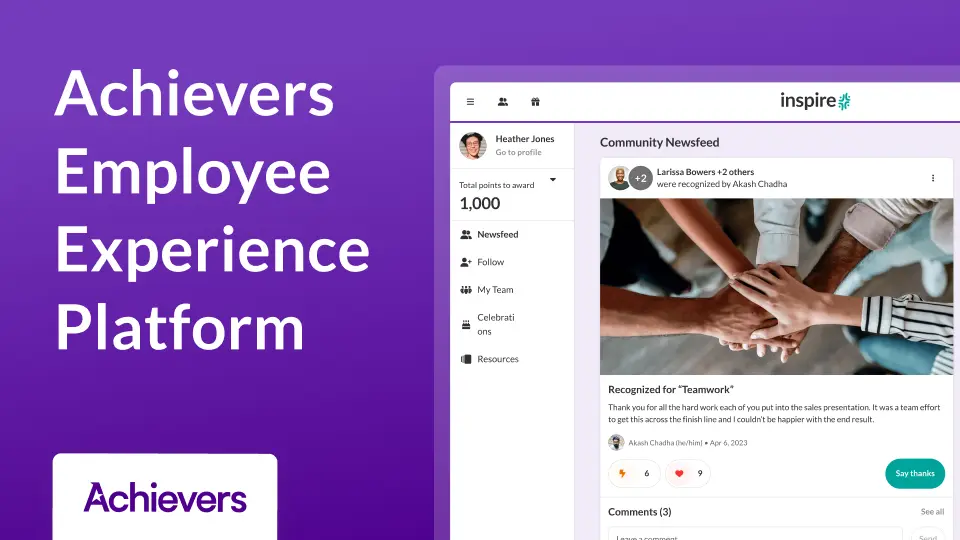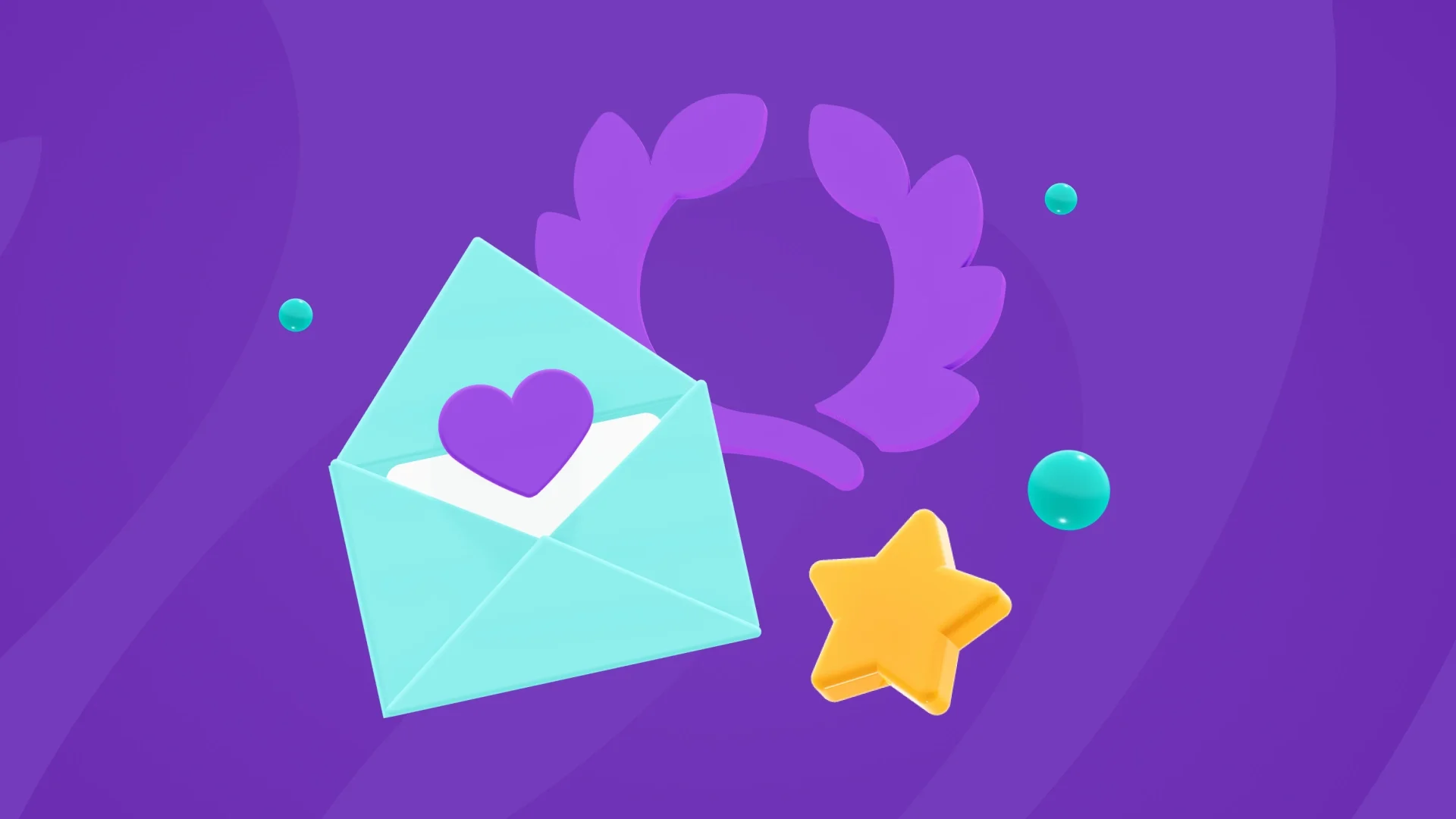Table of contents
Non-monetary rewards are key to a better employee experience, offering lasting impact beyond a paycheck. While financial incentives provide short-term boosts, meaningful recognition and growth opportunities build deep emotional connections and long-term commitment.
Achievers Workforce Institute (AWI) calls this emotional salary — the non-monetary factors that make employees feel valued. A strong emotional salary drives higher productivity, job satisfaction, and retention.
Achievers helps companies elevate emotional salary with a seamless recognition and rewards program. Through peer-to-peer recognition and a global rewards marketplace, Achievers ensures every recognition is personal, meaningful, and motivating.
Why non-monetary rewards matter
Fostering employee engagement requires more than just financial perks — it demands a culture of appreciation built on authentic, impactful rewards. Beyond their paychecks, employees want to feel valued, appreciated, and connected to a greater purpose. While salaries and bonuses are important, they’re not the only element that contributes to lasting engagement. Non-monetary rewards, such as recognition, career development, and flexible work arrangements, are key to building long-term employee motivation and loyalty.
In fact, Forbes reports that organizational culture and work-life balance are among the top drivers of job satisfaction, while longitudinal data from Gallup between 2022–2024 shows that employees that feel well-recognized are 45% less likely to turnover over the course of the two years.
Beyond personalized recognition, which is key to fostering connection and a sense of belonging, other non-monetary rewards such as career development programs and flexible work arrangements boost employee retention by investing in an employee’s growth within the company while also supporting work-life balance. When employees feel appreciated and supported, they are more engaged, productive, and committed to their company’s success.
By pairing financial incentives with non-monetary rewards, companies can create a thriving workplace where employees feel more motivated, leading to lower turnover and higher performance. After all, employees are driven not just by money but also by meaningful work and feeling valued for their contributions — which is why it’s important to also take into consideration the emotional salary that you’re offering.

Types of non-monetary rewards that work
Non-monetary rewards come in many forms, ranging from social recognition that fosters belonging, to career development opportunities that fuel growth. Work-life balance, experiential rewards, and personalized incentives are also other winning types of non-monetary rewards that ensure employees feel valued, motivated, and connected to their organization’s success.
Here, we’ll explore these five tried and true non-monetary reward ideas in greater detail:
1. Social recognition
Social recognition, encompassing both peer-to-peer and manager-led appreciation, is a powerful example of a non-monetary reward that is proven to boost employee engagement and retention.
According to Gallup, employees who receive effective recognition are five times as likely to feel connected to their organization’s culture and four times as likely to be engaged, while Forbes highlights that employees who receive social recognition are 55% less likely to seek new job opportunities.
By being publicly recognized through social media, internal newsletters, or a recognition platform, the increased visibility isn’t just motivating but it also reinforces the positive behaviors that you’d like your employees to repeat.
2. Career development opportunities
Career development opportunities, such as access to training, mentorship, and learning resources, are highly effective non-monetary rewards that have positive effects on engagement and retention. A global study revealed that organizations that provide training for engaged employees experience a 17% rise in productivity and a 21% gain in profitability, highlighting the connection between professional development and stronger financial performance.
To add, offering internal promotions and skill development programs is not only beneficial to morale but also reduces turnover. According to LinkedIn’s Workplace Learning Report, companies that prioritize professional development for their employees report a 32% improvement in retention and 28% boost in employee job satisfaction.
3. Work-life balance perks
Work-life balance perks, such as flexible work schedules, remote work options, additional paid time off, and wellness benefits, are other examples of non-monetary rewards that are a boon to employee satisfaction and retention. These perks help employees maintain a healthy balance between their personal and professional lives, leading to greater job satisfaction and reducing the risk of burnout.
A 2025 survey by Randstad found that 83% of employees prioritize work-life balance, ranking it slightly more important than compensation at 82%. Gallup research supports this notion, reporting that 76% of full-time hybrid employees see work-life balance as a key benefit of their setup, while 85% of fully remote workers feel the same.
4. Experiential rewards
Experiential rewards, such as company-sponsored travel, retreats, and unique workplace experiences, are another type of non-monetary reward that greatly improves employee job satisfaction. A 2024 Achievers survey revealed that employees that have access to a comprehensive rewards marketplace are 61% more likely to feel a deep sense of connection and belonging. They’re also 60% more likely to feel that they’ve been meaningfully recognized.
Experiential rewards don’t just create lasting memories and foster a sense of camaraderie among teams, but they also give the opportunity for employees to choose gifts that are truly meaningful to them.
5. Personalized incentives
When it comes to choosing gifts that are truly meaningful, personalized incentives are another type of non-monetary reward that cater to individual employee preferences. Options such as a gift card to a favorite restaurant or store, charitable donations, or exclusive event access shows that you’ve made an effort to personalize rewards that resonate with your employee’s values and interests.
Another example could be travel incentives, as a way to celebrate important employee milestones or as a non-monetary reward for reaching specific goals. For example, these incentives might include an all-expenses-paid trip for individuals or teams that hit their targets within a given period. According to a report by the Incentive Research Federation, 53% of senior leaders consider travel incentives a must-have, while 48% view them as a critical strategic advantage.
How Achievers helps deliver impactful non-monetary rewards
If you’re looking for a powerful tool to deliver non-monetary rewards to your workforce, Achievers has you covered. Through Achievers Recognize, organizations can offer real-time, peer-to-peer recognition — instant appreciation for all the hard work your employees bring to the table. Beyond social recognition, the platform also allows employees to redeem points for personalized gifts that are meaningful to them from a comprehensive rewards marketplace.
Achievers also offers data-driven engagement insights, allowing HR teams to optimize their recognition strategies and track the effectiveness of their rewards programs. By combining real-time recognition with customizable rewards and data-driven strategies, Achievers helps organizations build a motivated, loyal, and engaged workforce.
Success story: How Achievers helped transform General Motors’ recognition program
Achievers transformed General Motors’ (GM) recognition program by implementing a data-driven, comprehensive approach to employee engagement.
GM employees wanted more transparency, recognition, and personalized rewards, so the global automotive company partnered with Achievers to create a more connected, motivated workforce. With Achievers, they implemented a robust recognition platform that allowed their employees to send real-time recognition to their peers–further nurturing a culture of connection and appreciation.
In the first month, 87% of GM employees across the globe engaged with the platform, sending 80,000 unique recognitions. Appreciation quickly became a core part of the company culture, with 90% of employees actively participating each month and sending 60,000 to 80,000 recognitions, including 80% of managers.
GM also introduced non-monetary rewards, such as peer recognition and personalized rewards, resulting in increased engagement across 67,000 employees in 26 countries. Employees could redeem points for gifts and experiences that resonated with them, and as a result, GM employees felt more valued, leading to higher satisfaction and a stronger sense of belonging.
GM’s success with Achievers highlights the power of non-monetary rewards in driving engagement, building a positive work culture, and improving employee satisfaction.
Beyond bonuses: The lasting impact of non-monetary rewards
By offering non-monetary incentives such as public recognition, work-life balance perks, and experiential rewards — organizations can move towards creating company culture that values employees beyond their financial contributions.
Non-monetary rewards aren’t just a more holistic approach to employee engagement, but they also boost productivity, reduce turnover — ultimately motivating teams towards higher performance and organizational success. That’s because non-monetary rewards tap into what employees care about beneath the surface–being seen, acknowledged, and empowered to reach their full potential.
For organizations ready to effectively implement a non-monetary rewards program, there’s Achievers — a recognition and rewards platform that allows for real-time social recognition, and customizable reward programs. Armed with this tool, companies can help their employees feel more valued and connected at work–boosting their morale, engagement, and job satisfaction.
Explore Achievers’ employee recognition software to start building a more engaged and motivated workforce today.


